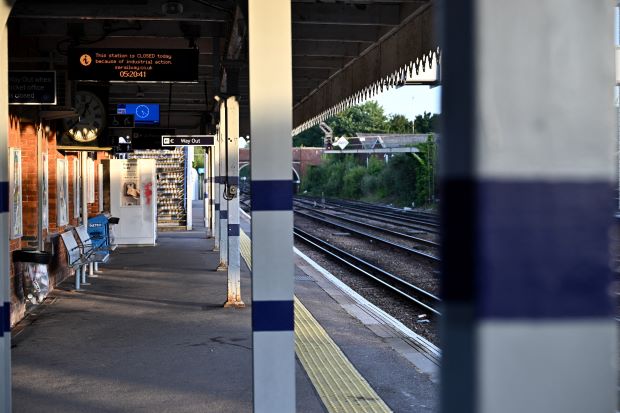UK train strike brings transit chaos
By Mark Landler and Eshe Nelson
LONDON — Britain was hobbled Tuesday (21) by its largest railway strike in three decades, halting trains across the country, throwing travel plans for tens of millions of Britons and visitors into chaos, and setting off what union and government leaders warned could be a long summer of labour unrest.
With last-ditch talks between the transport union and the rail operator collapsing Monday (20) night, hundreds of trains ground to a halt for the first of three planned days of strikes. Most trains will also probably be halted Thursday (23) and Saturday (25), with disruptions rippling across the system for the entire week.
In London, workers in the Underground system went on strike in a separate pension dispute, bringing much of the capital to a halt. With subway stations closed, the streets were clogged with cars and bicycles, as commuters sought alternative ways to get to work. Buses continued to run, and there was some skeleton train service.
“It’s been an absolute nightmare,” said Michaela Jones, 24, who had fruitlessly ordered taxis and Ubers, and lined up for buses in a 90-minute odyssey to travel to her job at a marketing agency in central London. “I knew there was going to be a strike, but I thought it would be easy to get other modes of transport.”
The strikes are a major test for Prime Minister Boris Johnson, who called on the unions to compromise on their demands at a time when the coronavirus pandemic has kept ridership and ticket revenue well below normal levels. He warned the public to expect a prolonged struggle to overhaul the finances of the rail system.
So far, the government has refused to intervene directly in the talks, which are between the unions and Network Rail, a company that manages the country’s railway system, as well as with the privatized train operators.
But with soaring food and fuel prices and wages that are failing to keep pace, Johnson is likely to face other restive workers across multiple industries. Teachers, airline employees and criminal-defence lawyers are among those who have threatened to walk off the job.
The main railway union, the National Union of Rail, Maritime and Transport Workers, known as the RMT, is demanding a pay raise in line with the increase in cost of living. In an interview Tuesday at the union’s headquarters, Mick Lynch, its general secretary, blamed the government for the strike, saying it was “a confection of their making.”
A deal should have been done in December, he said, when the retail price index, was 7.1%. The annual rate shot up to 11.1% in April, the highest since 1982. The latest wage increase offered by the train operators is far lower than that, though Lynch said wages were not the only variable.
“There’s more than one way to construct value in a package,” he said. “It doesn’t all have to be about salary.”
Johnson, however, blamed the union for what he claimed was forcing unacceptable fare increases on to passengers and trying to preserve work practices that date to the Victorian era.
“We need the union barons to sit down with Network Rail and the train companies and get on with it,” the prime minister said at a Cabinet meeting. The public, he said, would need “to stay the course, because these reforms, these improvements in the way we run our railways, are in the interests of the traveling public.”
Johnson’s transport secretary, Grant Shapps, dismissed the strikes as a “stunt.” Speaking to Sky News, he said that if the government intervened, “it wouldn’t resolve anything — in fact, it would make matters worse.”
Johnson’s Conservative Party faces critical parliamentary elections Thursday for two seats that have come open, and the strikes have become a political football. The opposition Labour Party accused the government of failing to break the deadlock. The Conservatives said Labour was cheering on a walkout that was inconveniencing millions of people and could impede Britain’s recovery from the pandemic.
In Wakefield, in northern England, one of the two districts holding elections, a local bus company has already been on strike for several days.
Britain is locked in the same economic vise of rising prices and lagging wage growth that is afflicting many other countries. When adjusted for inflation, pay is declining at the fastest pace in more than a decade — a problem that is likely to worsen as prices continue to rise and as the increases spread to more goods and services.
The disruption of global supply chains because of the pandemic and Russia’s invasion of Ukraine has pushed up prices for oil, natural gas, wheat and fertilizer. Fuel and food prices are rising at rates unseen in decades. In Britain, the squeeze on incomes has forced a reluctant government to offer financial aid to households.
Economists worry that the cost of living will constrain consumer spending, endanger fragile businesses and throw the economy into a recession. Britain’s economy showed signs of weakness in the first three months of the year.
At the same time, policymakers are concerned about rising prices becoming embedded in the economy, as companies increase their prices because of higher costs and workers demand higher wages.
Andrew Bailey, governor of the Bank of England, said this year that there needed to be “restraint” in wage bargaining, especially among high earners, otherwise inflation would get worse.
Industries have also lost workers to illness or other jobs during the pandemic, leading to serious staff shortages. In London, Heathrow and other airports are asking carriers to cancel flights because of a shortage of baggage handlers and other workers.
Employers are competing for staff with bonuses and wage increases, but workers are not feeling the benefits as inflation eats away at any gains. Other unions, including those representing teachers and National Health Service workers, are threatening to go on strike.
-New York Times


